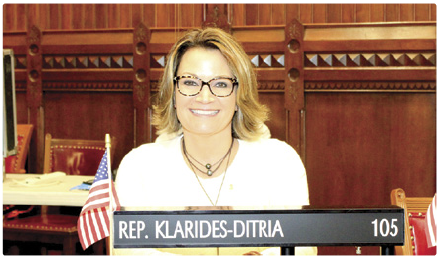Mar 5, 2018Getting Political
 Nicole Klarides-Ditria, ATC/L, Athletic Trainer at the Academy of our Lady of Mercy, Lauralton Hall High School in Milford, Conn., was raised to believe that when you are passionate about something, you put your heart into it 100 percent. That’s why, in 2016, she decided to run for a seat in the Connecticut House of Representatives — and won.
Nicole Klarides-Ditria, ATC/L, Athletic Trainer at the Academy of our Lady of Mercy, Lauralton Hall High School in Milford, Conn., was raised to believe that when you are passionate about something, you put your heart into it 100 percent. That’s why, in 2016, she decided to run for a seat in the Connecticut House of Representatives — and won.
“My sister is the House Minority Leader, and she had been encouraging me to do this since she began,” says Klarides-Ditria, who also serves as the Football Athletic Trainer at Seymour (Conn.) High School. “Our parents always encouraged us to do whatever we felt strongly about, and I wanted to give back to a town, an area, and a state that has given so much to me and my family.”
This isn’t Klarides-Ditria’s first venture into public office. She served as Deputy Mayor in the town of Seymour for several years. Through both roles, she has found that athletic training and politics share many similarities.
“Being a politician and working as an athletic trainer are both thankless jobs-you are always behind the scenes,” says Klarides-Ditria. “But when it comes down to it, who do athletes ask to get them back on the field? The athletic trainer. When something is wrong in a community, who do the constituents call? They contact their legislator and say, ‘Listen, you need to fix this.’ Both jobs involve helping people.”
In the first year of her two-year term, Klarides-Ditria kept the concerns of her fellow athletic trainers top of mind. She introduced House Bill 7171, which expands and updates the scope of practice of athletic trainers in the state. It was passed by both houses and signed into law by the Governor last summer.
“I worked with the athletic training faculties at Sacred Heart University and Southern Connecticut State University, as well as the Connecticut Athletic Trainers’ Association [CATA], to pass this legislation,” says Klarides-Ditria. “The CATA was already working on it before I stepped into office. It just took an athletic trainer’s point of view to open the other legislators’ eyes.”
As she manages her two roles, Klarides-Ditria makes sure her athletes aren’t lost in the shuffle. The state house is usually in session in the winter and early spring, and while this doesn’t overlap with her work at Seymour, it can make her days at Lauralton Hall hectic.
“I am at Lauralton Hall every day for all games and practices,” says Klarides-Ditria. “I’m usually up in Hartford at the state capitol at eight or nine in the morning and, ideally, I am on the road by one in the afternoon. Lauralton Hall gets out of school at 2:15 p.m. so I try to get there by 2:30 p.m.”
In the athletic training room, Klarides-Ditria doesn’t shy away from student-athletes’ questions about her morning job. “If a student brings up a political issue, I give them my opinion, but there are two sides to everything,” she says. “I am careful not to say they are wrong or that I am mad at them for feeling a certain way. I simply tell them, ‘This is what I believe, and this is why.’
“I’ve had great discussions with some of my athletes who have views that oppose mine,'” continues Klarides-Ditria. “At a certain point, you have to agree to disagree-that’s just a life lesson.”
In the end, being willing to hear all sides is what makes Klarides-Ditria effective at both her jobs. “I think that’s important with kids today,” says Klarides-Ditria. “You have to listen. It’s part of being a teacher, an athletic trainer, and even a legislator. If I’m not listening to people, I can’t do my jobs well.”
This article appeared in the March 2018 issue of Training & Conditioning.



